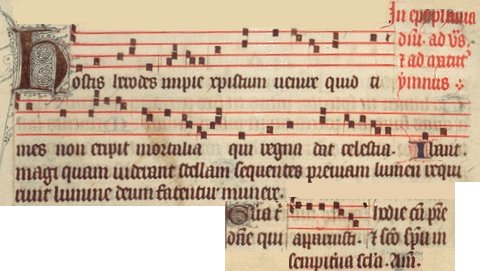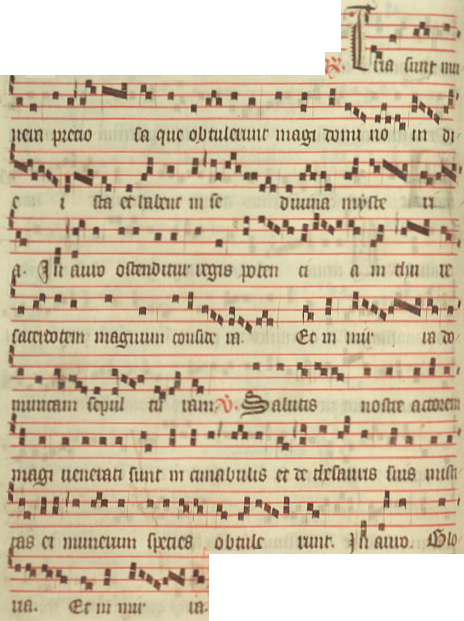Even Years: Maximus of Turin, Sermon 45, 1-3 (CCL 23, 182-183)
| Hodie uerus sol ortus est mundo, hodie in tenebris saeculi lumen egressum est. Deus factus est homo, ut homo deus fieret; formam serui dominus accepit, ut seruus uerteretur in dominum; caelorum et habitator et conditor habitauit in terris, ut homo colonus terrae migraret ad caelos.
| Today the true Sun has risen upon the world; amid universal darkness light has dawned. God has become man, so that men may become divine; the Lord has assumed the likeness of a slave, so that slaves may become lords. He who created the heavens as his dwelling place has made his home on earth, in order that earth's inhabitants may find their way to heaven.
| | O dies omni sole lucidior! o
tempus cunctis saeculis expectatius! quod praestolabantur angeli, quod seraphin
et cherubin et caelorum mysteria nescierunt, hoc in nostro tempore reuelatum
est; quod illi uidebant per speculum et per imaginem, nos cernimus in ueritate.
Qui loquebatur israhelitico populo per eseiam hieremiam et ceteros prophetas,
nunc nobis per filium loquitur. Videte quid sit inter uetus testamentum et
nouum! in illo loquebatur per nubilum, nobis loquitur per serenum; ibi deus
uidebatur in rubo, hic de uirgine deus nascitur; ibi ignis erat populi peccata
consumens, hic homo est populi peccata dimittens, inmo dominus ignoscens seruis
suis; nemo enim potest peccata dimittere nisi solus deus.
| O the glory of this day, eclipsing the very sun in its splendour, the culmination of centuries of waiting! The revelation to which the angels looked forward, the secret hidden from seraphim, cherubim, and every heavenly spirit has been disclosed to our generation. What former ages perceived in figures and images, we see in reality. The God who spoke to the people of Israel through Isaiah, Jeremiah, and the rest of the prophets now speaks to us through his Son. Mark the difference between the Old Testament and New! In the Old Testament God spoke in a storm cloud; in the New he speaks in the clear, calm light of day. In the Old Testament God appeared in a bush; in the New he is born of a virgin. In the Old Testament God was present as a fire consuming the sins of his people; in the New he is present as a man who forgives them—or rather, as the Lord who pardons his servants, since no one can forgive sin but God alone.
| | Siue hodie natus est dominus
iesus siue hodie baptizatus est —diuersa quippe opinio fertur in mundo, et pro
traditionum uarietate sententia est nobis—, illud constat ad liquidum, quod
siue hodie natus ex uirgine est siue renatus in baptismo, eius natiuitas et
carnis et spiritus nobis proficit; utrumque mysterium meum est, utraque
utilitas mea est. Dei filius non habebat necessarium, ut nasceretur ut
baptizaretur. Neque enim peccatum fecerat, quod ei remitteretur in baptismo;
sed illius humilitas nostra sublimitas est, illius crux nostra uictoria est,
illius patibulum est noster triumphus.
| There are various opinions current in the world, since our ideas reflect a diversity of traditions, but whether the Lord Jesus was born or baptized on this day, this much at least is clear: Christ's birth both in the flesh and in the spirit is to our benefit. Both are mysteries to me and both are advantageous to me. The Son of God had no need to be born or baptized. He had committed no sin that required forgiveness through baptism. On the contrary, his condescension is the cause of our exaltation, his cross our victory, his gibbet our triumph.
| | Gaudentes leuemus hoc signum in
umeris nostris, uictoriarum uexilla portemus, inmo talem labarum portemus in
frontibus! cum hoc signum in postibus nostris diabolus aspexerit, contremescit;
et qui aurata capitolia non timent crucem timent; qui contemnunt sceptra
regalia et purpuras caesarum et dapes, christiani sordes et ieiunia
pertimescunt...
| Let us joyfully raise the banner of his cross on our shoulders and bear the ensign of his victory; better still, let us carry this great standard as a sign emblazoned on our foreheads. Whenever the devil sees this sign on our doorposts he trembles; demons who have no reverence for gilded temples fear the cross. They may despise royal sceptres, grand banquets, and imperial purple, but they are cowed by the fasting and humble garb of Christians.
| | Exultemus itaque, fratres carissimi, et ad crucis
similitudinem sanctas ad caelum leuemus manus! cum sic nos daemones armatos
uiderint, opprimentur. Quando moses erectas habebat manus, uincebatur amalech;
si paululum illae conciderant, inualescebat. Antemnae nauium et uelorum cornua
sub figura nostrae crucis uolitant. Aues quoque ipsae, quando in sublimiora
tolluntur et pendent per aerem, extensis alis imitantur crucem. Sed et trophea
ipsa et uictoriae triumphorum ornatae cruces sunt, quas non solum frontibus sed
etiam animabus quoque nostris habere debemus, ut cum sic fuerimus armati,
calcemus super aspidem et basiliscum in christo iesu, cui est gloria in saecula
saeculorum.
| Let us be filled with exultation then, dear friends, and lift up holy hands to heaven in the form of a cross. When Moses held up his hands Amalek was defeated, but if he lowered them for a while Amalek prevailed. Birds too resemble the cross in shape as they are borne aloft and glide through the air on outstretched wings. Even our memorials and victory processions take the form of crosses. Surely then we ought to bear the cross not on our foreheads only but within our very souls, so that by its protection we may trample on the snake and the serpent in Christ Jesus, to whom belongs the glory for ever and ever.
|
Odd Years: Faustus of Riez, Sermon 5 on Epiphany
| Die autem tertio nuptiae fiebant. Quae istae sunt nuptiae, nisi vota et gaudia salutis humanae, quae vel per confessionem Trinitatis, vel per fidem resurrectionis, die tertio in huius numeri mysterio celebrantur?
| On the third day there was a wedding. What wedding can this be but the joyful marriage of our salvation, a marriage celebrated on the third day, according to the symbolic meaning of that number, by profession of faith in the Trinity or by belief in the resurrection?
| | Nam ideo et in alia Evangelii lectione, cum choro et symphoniis, et nuptialibus vestibus, reditus filii iunioris, id est, conversio populi gentilis excipitur.
| When we turn to another passage of the Gospel we read of the music, dancing, and wedding garments that welcomed the return of the younger son. Here the conversion of the Gentiles is signified.
| | Itaque tamquam sponsus procedens de thalamo suo descendit ad terras Ecclesiae ex gentibus congregandae, suscepta incarnatione iungendus, cui et arras et dotem dedit: arras, quando Deus homini iunctus est: dotem, quando pro salute hominis immolatus est. Arras, praesentem redemptionem: dotem vero, vitam intellegimus aeternam. Haec itaque videntibus miracula erant, intellegentibus sacramenta. Si enim bene respicimus, quodammodo in aquis ipsis similitudo baptismatis et regenerationis exponitur. Dum enim aliud ex alio intra se efficitur, dum inferior creatura in speciem meliorem secreta conversione transfunditur, mysterium secundae nativitatis peragitur. Mutantur subito aquae, homines postmodum mutaturae.
| Like a bridegroom coming forth from his marriage chamber, our incarnate Lord descended to earth in order to be espoused to the Church which was to be formed of all nations. To his Church he gave a pledge of betrothal and a marriage dowry: a pledge when his divinity was joined to our humanity, a dowry when he was offered in sacrifice for our salvation By the pledge we understand our present redemption; by the dowry, eternal life.
To those who see only with the outward eye, all these events are strange and wonderful; to those who understand, they are also signs. For if we look closely we can see a certain likeness to our baptismal rebirth in the water itself. One substance is inwardly changed into another, and in a hidden way a lesser creature is changed into a greater. All this points to the hidden reality of our second birth. At Cana water was suddenly changed; it was destined later to change men.
| | Operante ergo Christo in Galilaea vinum fit, it est, recedit lex, gratia succedit: umbra removetur, veritas repraesentatur: carnalia spiritalibus comparantur: in novum testamentum observatio vetusta transfertur: sicut beatus Apostolus dicit: Vetera transierunt, et ecce facta sunt nova: et sicut aquae, quae in hydriis continentur, nihil minuunt ex eo quod erant, et tunc incipiunt esse quod non erant, ita lex non perit per adventum Christi manifesta, sed proficit.
| By Christ's action in Galilee, wine is made; that is, the law withdraws and grace takes its place, the shadows fade and truth appears, the things of the flesh are paralleled by spiritual realities, and the old covenant with its outward discipline is transformed into the new. As the blessed Apostle says, the old order has passed away; now all is new. Like the water in the jars, which is not diminished in quantity but has become a different substance, so the law is not destroyed by Christ's coming but brought to fulfilment.
| | Vino ergo deficiente, vinum aliud ministratur: bonum quidem vinum est veteris testamenti, sed novi melius; vetus testamentum, quod Iudaei observant, vanescit in littera; novum, quod ad nos pertinet, saporem vitae reddit in gratiam.
| When the wine fails, new wine is served. The wine of the old covenant is good, but the wine of the new is better. The old covenant, which the Jews observed, has become obsolete according to the letter; the new covenant, which belongs to us, has the savour of life and is filled with grace.
| | Bonum vinum, idest, bonum praeceptum, est legis, quando audis: Diliges proximum tuum, et odio habebis inimicum tuum. Sed melius et fortius vinum est Evangelii, quando audis: Ego autem dico vobis, diligite inimicos vestros, et benefacite iis qui oderunt vos.
| [The good wine, that is, a good precept, you can hear in the Law: Love your neighbor as yourself, and hate your enemy. But the Gospel wine is better and stronger: But I say to you, Love your enemies, do good to those who hate you.]
|
| |




